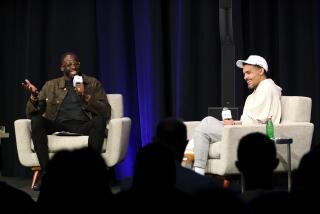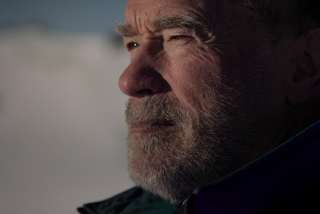Dan Seemed Larger Than Life : Man Who Helped Forge UCI Was Competitor to the End
- Share via
The most vivid recollection I have of Dan Aldrich is standing across a tennis net from him. He dominated the court simply by his presence, just as he dominated the first two formative decades of UC Irvine. My son and I once played Aldrich and UCI scientist Sherry Rowland, almost as large, in a tournament doubles match. We’re not small, but we felt like pygmies, thrown into an arena with giants.
It’s hard for me to believe that Dan Aldrich is gone. He was one of those rare people who exude such strength that it is almost inconceivable that anything can bring them down. Seeing him on the practice field at UCI only a few months after a cancerous colon had been removed, throwing his beloved discus, simply reinforced that conviction. Dan Aldrich had a lifestyle so unflaggingly healthy that he almost licked cancer. And he certainly had it backed into a corner for several productive years.
He told me about that night in May, 1987, in Santa Barbara, almost as if it had happened to someone else. “I got up in the middle of the night to find I was bleeding. I was dizzy too--and I’ve never been dizzy or weak in my whole life. At the hospital, I was determined to walk in and I did.”
When his colon was removed the next day, it was discovered that the cancer had spread into other parts of his body. There were three ways of treating it, and Dan Aldrich chose the most innovative--and the one that gave him the greatest freedom to enjoy the kind of vigorous exercise that was mother’s milk to him. For the rest of his life, he wore a battery-operated box that constantly dripped medication into his system.
It took an iron constitution, developed through long years of dedication to fitness, to tolerate steady doses of the medication. And because the technique was relatively new, it was uncertain how long Aldrich could go without getting off the medication. Six months after his surgery, he told me proudly: “The longest anyone could tolerate it up to then was five weeks, and I went 6 1/2 weeks the first time.”
That comment caught Dan Aldrich rather precisely. He was a tough, aggressive competitor who liked to win--whether the game was tolerance for medication or social tennis--but it was the competition itself on which he thrived. He simply loved to stretch that wonderfully athletic body.
There was no better example than his participation in the Senior Olympics in Australia seven months after his surgery. He had a longtime competition going with a Finnish athlete named Jobbila who had the distinction of being the only senior citizen in the world to beat Dan Aldrich in the discus throw. Although Jobbila was nine years younger than Aldrich, they fell into the same competitive age bracket. That happened in the Australian games of 1987, and Aldrich was eager to have another shot at Jobbila. So he took his medication box and headed to Brisbane. Although Aldrich came in second in the discus, he won first place in courage, determination and setting an example of living life to the fullest as long as it was given to him. He made a few concessions, mostly grudgingly. He told me when he was working out for the Senior Olympics that “I only play mixed doubles instead of singles in tennis when I’m wearing the pump.” To Dan Aldrich that was a major concession.
His job as UCI’s first chancellor was maybe the toughest competition he ever entered. I was privileged to be a part of the growing pains of UCI, and I’m convinced that Dan Aldrich may have been the only educator in the UC system who could have navigated those troubled waters. He had to deal, at the same time, with noisy and sometimes violent campus protests over the Vietnam War and the bad-mouthing of Orange County’s political right that accused this staunchly conservative--in the very best sense of that word--man of all sorts of subversive activities and even several times tried to get his job.
But Aldrich never wavered from the principles in which he believed, and he moved through all this turmoil with the same sort of vigorous self-assurance and sense of fair play and open competition with which he threw the discus.
Dan Aldrich left a considerable legacy for all of us whose lives he touched even fleetingly. I talked with him on the practice field at UCI after his surgery. He was working out alone and seemed to be expending more of his time and energy retrieving the discus than throwing it. So I suggested that I’d be happy to help him conserve his energy by chasing down the discus for him.
And he replied--not unappreciatively but quite firmly: “I don’t want anybody shagging for me.”
That’s the way he lived; nobody ever shagged for him. He was always out front, even after he learned that the cancer hadn’t been contained by his first operation. He had theoretically retired by that time.
So it was no surprise that after his surgery, he also refused to retire from life. If there is any regret, it would perhaps be that he won’t have another shot at Jobbila in 1990. Dan Aldrich would have welcomed that.


